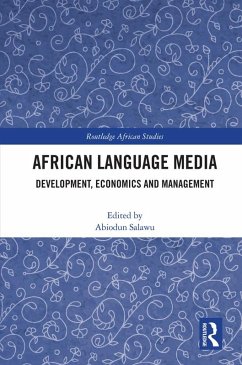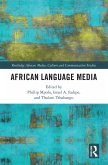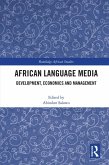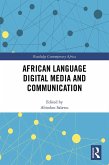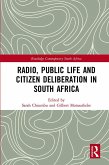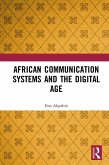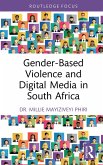African Language Media (eBook, PDF)
Development, Economics and Management
Redaktion: Salawu, Abiodun
44,95 €
44,95 €
inkl. MwSt.
Sofort per Download lieferbar

22 °P sammeln
44,95 €
Als Download kaufen

44,95 €
inkl. MwSt.
Sofort per Download lieferbar

22 °P sammeln
Jetzt verschenken
Alle Infos zum eBook verschenken
44,95 €
inkl. MwSt.
Sofort per Download lieferbar
Alle Infos zum eBook verschenken

22 °P sammeln
African Language Media (eBook, PDF)
Development, Economics and Management
Redaktion: Salawu, Abiodun
- Format: PDF
- Merkliste
- Auf die Merkliste
- Bewerten Bewerten
- Teilen
- Produkt teilen
- Produkterinnerung
- Produkterinnerung

Bitte loggen Sie sich zunächst in Ihr Kundenkonto ein oder registrieren Sie sich bei
bücher.de, um das eBook-Abo tolino select nutzen zu können.
Hier können Sie sich einloggen
Hier können Sie sich einloggen
Sie sind bereits eingeloggt. Klicken Sie auf 2. tolino select Abo, um fortzufahren.

Bitte loggen Sie sich zunächst in Ihr Kundenkonto ein oder registrieren Sie sich bei bücher.de, um das eBook-Abo tolino select nutzen zu können.
This edited volume considers why the African language press is unstable and what can be done to develop quality African language journalism into a sustainable business.
- Geräte: PC
- mit Kopierschutz
- eBook Hilfe
Andere Kunden interessierten sich auch für
![African Language Media (eBook, PDF) African Language Media (eBook, PDF)]() African Language Media (eBook, PDF)42,95 €
African Language Media (eBook, PDF)42,95 €![African Language Media (eBook, ePUB) African Language Media (eBook, ePUB)]() African Language Media (eBook, ePUB)44,95 €
African Language Media (eBook, ePUB)44,95 €![African Language Digital Media and Communication (eBook, PDF) African Language Digital Media and Communication (eBook, PDF)]() African Language Digital Media and Communication (eBook, PDF)43,95 €
African Language Digital Media and Communication (eBook, PDF)43,95 €![African Media and Communication (eBook, PDF) African Media and Communication (eBook, PDF)]() African Media and Communication (eBook, PDF)43,95 €
African Media and Communication (eBook, PDF)43,95 €![Radio, Public Life and Citizen Deliberation in South Africa (eBook, PDF) Radio, Public Life and Citizen Deliberation in South Africa (eBook, PDF)]() Radio, Public Life and Citizen Deliberation in South Africa (eBook, PDF)42,95 €
Radio, Public Life and Citizen Deliberation in South Africa (eBook, PDF)42,95 €![African Communication Systems and the Digital Age (eBook, PDF) African Communication Systems and the Digital Age (eBook, PDF)]() Eno Ime AkpabioAfrican Communication Systems and the Digital Age (eBook, PDF)44,95 €
Eno Ime AkpabioAfrican Communication Systems and the Digital Age (eBook, PDF)44,95 €![Gender-Based Violence and Digital Media in South Africa (eBook, PDF) Gender-Based Violence and Digital Media in South Africa (eBook, PDF)]() Millie Mayiziveyi PhiriGender-Based Violence and Digital Media in South Africa (eBook, PDF)19,95 €
Millie Mayiziveyi PhiriGender-Based Violence and Digital Media in South Africa (eBook, PDF)19,95 €-
-
-
This edited volume considers why the African language press is unstable and what can be done to develop quality African language journalism into a sustainable business.
Dieser Download kann aus rechtlichen Gründen nur mit Rechnungsadresse in A, B, BG, CY, CZ, D, DK, EW, E, FIN, F, GR, HR, H, IRL, I, LT, L, LR, M, NL, PL, P, R, S, SLO, SK ausgeliefert werden.
Produktdetails
- Produktdetails
- Verlag: Taylor & Francis eBooks
- Seitenzahl: 308
- Erscheinungstermin: 16. November 2020
- Englisch
- ISBN-13: 9781000223958
- Artikelnr.: 60300227
- Verlag: Taylor & Francis eBooks
- Seitenzahl: 308
- Erscheinungstermin: 16. November 2020
- Englisch
- ISBN-13: 9781000223958
- Artikelnr.: 60300227
- Herstellerkennzeichnung Die Herstellerinformationen sind derzeit nicht verfügbar.
Abiodun Salawu is Professor of Journalism, Communication and Media Studies and Director of the research entity Indigenous Language Media in Africa at the North-West University, South Africa.
Introduction Part 1: Political Economy of African Language Media 1. The
political economy of indigenous language media in Nigeria and the challenge
of survival in digital age 2. The politics of language and the
underdevelopment of African language press in Zimbabwe Part 2:Mixed Bag:
Failures and Successes of African Language Newspapers 3. In the dead end:
the decline of the indigenous language press in post-colonial Zimbabwe 4.
Making sense of South African Mmega Dikgang's transition from Setswana to
English 5. The extinction of siSwati-language newspapers in the Kingdom of
Eswatini 6. Indigenous language newspapers in Zimbabwe: Kwayedza and
Umthunywa and the struggle for survival 7. Indigenous language media and
the survival game: the Alaroye newspaper example from Nigeria Part 3:
Management and Sustainability of African Language Media 8. Reimagining the
Future of Indigenous Language Press in the Digital Era 9. A survey of the
management, organisation, structure, content and columns of the
contemporary Yorùbá newspaper 10. The challenges of sustaining African
language newspaper businesses: the Yorùbá language example from Nigeria
Part 4: Towards quality: African Language Journalism Development 11. The
significance of African storytelling in journalism 12. African language
journalism in Ghana and the quest for quality and sustainable broadcast
journalism: an investigation of Peace FM 13. Editorial policies and the
isiXhosa language newspapers at Caxton Media and Independent Media Part 5:
Focus on the Broadcast Media 14. News syndication in local language
broadcasting in South Africa: hegemonic Infiltration or hybridity? Part 6:
Borrowing a Leaf 15. African language newspaper sustainability: lessons to
learn from Asia
political economy of indigenous language media in Nigeria and the challenge
of survival in digital age 2. The politics of language and the
underdevelopment of African language press in Zimbabwe Part 2:Mixed Bag:
Failures and Successes of African Language Newspapers 3. In the dead end:
the decline of the indigenous language press in post-colonial Zimbabwe 4.
Making sense of South African Mmega Dikgang's transition from Setswana to
English 5. The extinction of siSwati-language newspapers in the Kingdom of
Eswatini 6. Indigenous language newspapers in Zimbabwe: Kwayedza and
Umthunywa and the struggle for survival 7. Indigenous language media and
the survival game: the Alaroye newspaper example from Nigeria Part 3:
Management and Sustainability of African Language Media 8. Reimagining the
Future of Indigenous Language Press in the Digital Era 9. A survey of the
management, organisation, structure, content and columns of the
contemporary Yorùbá newspaper 10. The challenges of sustaining African
language newspaper businesses: the Yorùbá language example from Nigeria
Part 4: Towards quality: African Language Journalism Development 11. The
significance of African storytelling in journalism 12. African language
journalism in Ghana and the quest for quality and sustainable broadcast
journalism: an investigation of Peace FM 13. Editorial policies and the
isiXhosa language newspapers at Caxton Media and Independent Media Part 5:
Focus on the Broadcast Media 14. News syndication in local language
broadcasting in South Africa: hegemonic Infiltration or hybridity? Part 6:
Borrowing a Leaf 15. African language newspaper sustainability: lessons to
learn from Asia
Introduction Part 1: Political Economy of African Language Media 1. The
political economy of indigenous language media in Nigeria and the challenge
of survival in digital age 2. The politics of language and the
underdevelopment of African language press in Zimbabwe Part 2:Mixed Bag:
Failures and Successes of African Language Newspapers 3. In the dead end:
the decline of the indigenous language press in post-colonial Zimbabwe 4.
Making sense of South African Mmega Dikgang's transition from Setswana to
English 5. The extinction of siSwati-language newspapers in the Kingdom of
Eswatini 6. Indigenous language newspapers in Zimbabwe: Kwayedza and
Umthunywa and the struggle for survival 7. Indigenous language media and
the survival game: the Alaroye newspaper example from Nigeria Part 3:
Management and Sustainability of African Language Media 8. Reimagining the
Future of Indigenous Language Press in the Digital Era 9. A survey of the
management, organisation, structure, content and columns of the
contemporary Yorùbá newspaper 10. The challenges of sustaining African
language newspaper businesses: the Yorùbá language example from Nigeria
Part 4: Towards quality: African Language Journalism Development 11. The
significance of African storytelling in journalism 12. African language
journalism in Ghana and the quest for quality and sustainable broadcast
journalism: an investigation of Peace FM 13. Editorial policies and the
isiXhosa language newspapers at Caxton Media and Independent Media Part 5:
Focus on the Broadcast Media 14. News syndication in local language
broadcasting in South Africa: hegemonic Infiltration or hybridity? Part 6:
Borrowing a Leaf 15. African language newspaper sustainability: lessons to
learn from Asia
political economy of indigenous language media in Nigeria and the challenge
of survival in digital age 2. The politics of language and the
underdevelopment of African language press in Zimbabwe Part 2:Mixed Bag:
Failures and Successes of African Language Newspapers 3. In the dead end:
the decline of the indigenous language press in post-colonial Zimbabwe 4.
Making sense of South African Mmega Dikgang's transition from Setswana to
English 5. The extinction of siSwati-language newspapers in the Kingdom of
Eswatini 6. Indigenous language newspapers in Zimbabwe: Kwayedza and
Umthunywa and the struggle for survival 7. Indigenous language media and
the survival game: the Alaroye newspaper example from Nigeria Part 3:
Management and Sustainability of African Language Media 8. Reimagining the
Future of Indigenous Language Press in the Digital Era 9. A survey of the
management, organisation, structure, content and columns of the
contemporary Yorùbá newspaper 10. The challenges of sustaining African
language newspaper businesses: the Yorùbá language example from Nigeria
Part 4: Towards quality: African Language Journalism Development 11. The
significance of African storytelling in journalism 12. African language
journalism in Ghana and the quest for quality and sustainable broadcast
journalism: an investigation of Peace FM 13. Editorial policies and the
isiXhosa language newspapers at Caxton Media and Independent Media Part 5:
Focus on the Broadcast Media 14. News syndication in local language
broadcasting in South Africa: hegemonic Infiltration or hybridity? Part 6:
Borrowing a Leaf 15. African language newspaper sustainability: lessons to
learn from Asia
